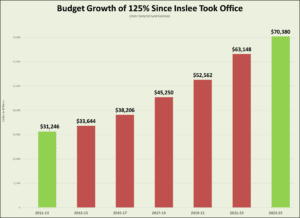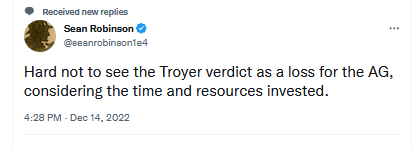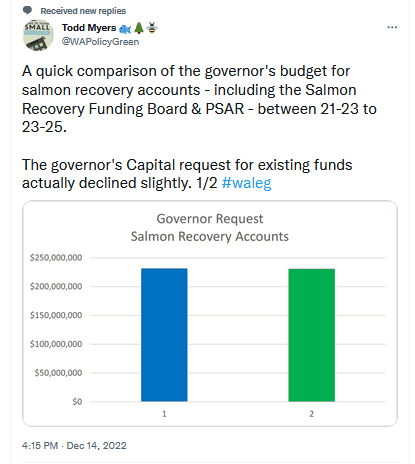Governor Inslee’s budget again demonstrates that his priority is to keep expanding the size and cost of state government and not to help lower-income residents who are struggling due to liberal policies.

State

Governor Jay Inslee continued his liberal quest to rapidly increase the size and cost of state government with the release of his 2023 – 2025 proposed budget, which is 12% larger than the last state budget and 125% larger than the budget when he came into office in 2013. While media headlines repeat verbatim from the communication staff’s media release about what the $70.4 billion budget says about Governor Inslee’s legislative priorities, the fact is this budget has the same top priority as all of Governor Inslee’s previous budgets – increase state revenues so more government employees are hired, then the government union bosses can take more dues fees from government workers’ paychecks, and in return the union bosses can kickback even more money into funding Democrat politicians’ campaigns and supporting far-Left organizations.
Republican legislators criticized the governor’s proposed budget for things it does not include despite being $7.23 billion larger than the state budget for the 2021 – 2023 biennium. Republican Senate budget leader Lynda Wilson (Vancouver) stated her concern that the governor’s priorities apparently do not include helping school children who suffered significant education loss, which are the results of students being kept out of schools (longer than nearly every state in the country) due to governor’s emergency orders and teacher unions’ selfish demands during the pandemic. The governor’s budget has less than 44% of the state’s budget going to schools, which is far below the 50% Republican’s spent when they controlled the Senate a few years ago.
Senator Wilson also noted that Governor Inslee continued to demonstrate his lack of concern for the financial struggles of lower income workers who are having a tough time due to liberal inflationary policies and the dramatic rise in fuel prices. The senator noted that fuel prices will rise again soon as the governor’s cap-and-tax policies are expected to increase fuel prices (already the third highest in the country) by over 40 cents a gallon. Senator Wilson said, “The 6 billion dollars in reserve are more than enough to support meaningful tax relief for the average Washington family – even something temporary to offset the effects of record price inflation. Unfortunately, the governor is showing once again that in his world, government’s desires come ahead of families’ needs.” (Seattle Times and Senate Republican Caucus media release)
The Building Industry Association of Washington (BIAW) stated its members were encouraged that Governor Inslee said that reducing homelessness and increasing housing supply were top priorities of his latest budget proposal, yet the trade association’s executive vice president asserts that “what he offers is not a solution to the problem.” The governor has proposed increasing the state’s debt by $4 billion to fund housing construction over the next six years. This proposal will need to be approved by both the legislature and the voters.
BIAW’s Greg Lane argues, “Just spending taxpayer money without addressing the systemic policy failures that have driven up the cost of housing the past two decades is senseless. To really make housing more affordable, we need fundamental changes to our state and local planning, land use, permitting and regulatory processes.”
Lane stressed that only 15% of Washington residents can afford to purchase an average priced home (currently the median price is $643,400). This is due to lack of supply caused by environmental and permitting regulations which has caused the state to be “fifth in the nation for underproduction of housing.” Lane stated these regulations are adding more than $31,000 to the cost of homes.
Lane stated if the governor and the legislative Democrats were truly concerned about the short supply of housing then they would work with builders to work on four significant issues:
- Permit timeline reform;
- State environmental policy act (SEPA) threshold exemptions;
- State Building Code Council reform; and
- Impact fee deferral program reform.
Lane concludes, “These policy reforms are what’s really necessary to reduce the costs of housing. They will also reduce the costs of building the government-subsidized housing the governor proposes.” (Building Industry Association of Washington media release)
It is worth noting that the governor’s proposed budget counts on the state overturning the Douglas County Superior Court’s ruling that the Democrats’ state income tax on capital gains was illegal. On the revenue side of Governor Inslee’s proposed budget has the state collecting $1.4 billion from the illegal tax. On the expenditure side, he has the state spending $3,952,000 in fiscal year 2024 and $2,621,000 in fiscal year 2025 to collect the unconstitutional tax.
Evidently the governor is confident the nine liberal judges on the Washington State Supreme Court will ignore over 100 years of state legal precedent and the views of the IRS and 49 other states that the tax is a tax on income which is unconstitutional in Washington State. The court has scheduled to hold a hearing on the state’s appeal of the Douglas County Superior Court’s decision on January 26th. Here is a summary of the amicus legal briefs filed in the case. Governor Inslee’s proposed budget highlights, Jason Mercier email, and Washington Policy Center summary of amicus briefs)
The Citizen Action Defense Fund (CADF) filed a lawsuit against Governor Jay Inslee’s office for failing to provide public documents relating to its secret contract negotiations with government employee unions which resulted in nearly a billion dollars in increased state spending for salaries and benefits. The CADF claims in the lawsuit filed in Thurston County Superior Court that it sought public records from the governor’s office on the negotiations, but the Office of Financial Management (within the governor’s office) said it could not make the records available until after the legislature approves the agreement. CADF argues that the governor’s office excuse is not a legally acceptable exemption of the state’s public records disclosure laws. The state now has 20 days to respond to CADF lawsuit. (Citizen Action Defense Fund media release)
The sharp decrease in traffic on Washington State’s toll roads has cost the state $206 million dollars (36%) based on what the state collected prior to the pandemic in 2019. Twice the state has had to lower its estimates on what it was expecting to receive as fewer people are commuting on the toll highways. The express lanes on I-405 have seen the largest drop in commuters, which has seen a 65% drop in collections from the state’s original forecast. (MyNorthwest)
Western Washington
A lifelong resident of Seattle’s Central District has filed a lawsuit against the City of Seattle stating its Mandatory Housing Affordability (MHA) ordinance has made it unaffordable for her to build housing for family members on the property she has owned for 25 years. Anita Adams sought to build additions to her home so that her two children could continue to live in Seattle and for her father-in-law could move in as well. But when she researched the plan she found out that due to the MHA, she would have to pay more than $75,000 just for permits. As the result it is unaffordable for Adams to build the additions and her children are forced to live outside of Seattle (because it is too expensive for them to reside near their mom) and must make long commutes to work every day.
The MHA program went into effect in 2019 and it charges exorbitant fees to those who add housing units to their property if the units are not rented out for below market value for the next 75 years. The ordinance makes no distinction between a landowner adding a mother in law unit to their property and a major developer constructing a large luxury apartment complex.
Adams said her family has lived in the Central District for three generations and she has endured other City of Seattle policies which have nearly forced her to move. She said she filed the lawsuit because “The city should be encouraging residents to develop for themselves—to take care of their friends and family—rather than make development something only developers can afford to do.” (Institute for Justice media release)
The illegal long strike conducted by the Seattle teachers union at the start of the school year will force students to again suffer through the disastrous teaching method of remote learning if there are any “snow days” in 2023. The Seattle Public Schools posted on its website that if snow makes it impossible to transport students to and from school, then the district will either delay classes for 2 hours or return to remote learning for the day. Thus students who are desperately attempting to regain some of the learning loss they experienced during the year they were forced into remote learning, will once again have to return to that failed teaching method if it snows because of the teachers’ illegal strike. The school district has already revised the school year calendar because of the illegal strike and has June 30th as the last day of school. (Seattle Public Schools website)
Eastern Washington
Jon DeVaney of the Washington State Tree Fruit Association says that fruit growers are currently hurting because of inflation, the large increase in fuel prices, and the state mandate on overtime pay for farmworkers. State apple growers saw a 20% reduction in their crops due to a cold snap last spring and another one just before harvest. This significantly reduced the size of their apples. Farmers experienced a smaller crop while paying higher fuel prices to operate farming machinery and to transport the products to market, and paid higher overtime wages to harvest the crops. (NW News Network)
The first outbreak of avian flu in a commercial flock in the state was detected on Wednesday at a Tr-Cities area farm. The farmer reported a sudden increase in chicken deaths to the state and test confirmed it was the highly pathogenic avian influenza. There have been several cases of the virus infecting wild birds, but this was the first positive case in a large commercial facility in the state. All the chickens on the farm were humanly killed to prevent the spread of the disease and no food product from the farm will enter the nation’s food supply system. (Tri-Cities Herald)
Overheard on the Interwebs...
Please Support Shift's Coverage
Do you like The Daily Briefing? Do you want to keep seeing coverage of issues which are important to you?
Shift was the only Washington media outlet in 2022 to interview legislative candidates to obtain their views on the important issues facing Washington State voters.
Please consider making a contribution to ensure Shift continues to provide daily updates on the shenanigans of the liberal establishment.
Forward this to a friend. It helps us grow our community and serve you better.
You can also follow SHIFTWA on social media by liking us on Facebook and following us on Twitter.
If you feel we missed something that should be covered, email us at [email protected].



